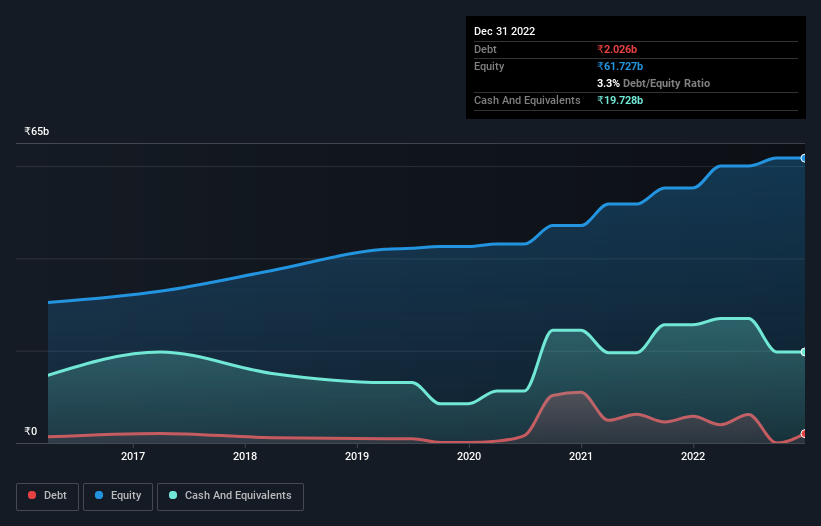
Howard Marks put it nicely when he said that, rather than worrying about share price volatility, 'The possibility of permanent loss is the risk I worry about... and every practical investor I know worries about.' When we think about how risky a company is, we always like to look at its use of debt, since debt overload can lead to ruin. We can see that Havells India Limited (NSE:HAVELLS) does use debt in its business. But the real question is whether this debt is making the company risky.
When Is Debt A Problem?
Debt and other liabilities become risky for a business when it cannot easily fulfill those obligations, either with free cash flow or by raising capital at an attractive price. In the worst case scenario, a company can go bankrupt if it cannot pay its creditors. However, a more common (but still painful) scenario is that it has to raise new equity capital at a low price, thus permanently diluting shareholders. Having said that, the most common situation is where a company manages its debt reasonably well - and to its own advantage. When we examine debt levels, we first consider both cash and debt levels, together.
Check out our latest analysis for Havells India
What Is Havells India's Net Debt?
As you can see below, Havells India had ₹2.03b of debt at September 2022, down from ₹5.77b a year prior. But on the other hand it also has ₹19.7b in cash, leading to a ₹17.7b net cash position.

A Look At Havells India's Liabilities
We can see from the most recent balance sheet that Havells India had liabilities of ₹33.7b falling due within a year, and liabilities of ₹6.40b due beyond that. On the other hand, it had cash of ₹19.7b and ₹5.92b worth of receivables due within a year. So its liabilities total ₹14.5b more than the combination of its cash and short-term receivables.
Having regard to Havells India's size, it seems that its liquid assets are well balanced with its total liabilities. So while it's hard to imagine that the ₹751.2b company is struggling for cash, we still think it's worth monitoring its balance sheet. Despite its noteworthy liabilities, Havells India boasts net cash, so it's fair to say it does not have a heavy debt load!
On the other hand, Havells India's EBIT dived 13%, over the last year. We think hat kind of performance, if repeated frequently, could well lead to difficulties for the stock. The balance sheet is clearly the area to focus on when you are analysing debt. But ultimately the future profitability of the business will decide if Havells India can strengthen its balance sheet over time. So if you want to see what the professionals think, you might find this free report on analyst profit forecasts to be interesting.
Finally, a company can only pay off debt with cold hard cash, not accounting profits. Havells India may have net cash on the balance sheet, but it is still interesting to look at how well the business converts its earnings before interest and tax (EBIT) to free cash flow, because that will influence both its need for, and its capacity to manage debt. Over the most recent three years, Havells India recorded free cash flow worth 77% of its EBIT, which is around normal, given free cash flow excludes interest and tax. This cold hard cash means it can reduce its debt when it wants to.
Summing Up
While it is always sensible to look at a company's total liabilities, it is very reassuring that Havells India has ₹17.7b in net cash. The cherry on top was that in converted 77% of that EBIT to free cash flow, bringing in ₹11b. So we are not troubled with Havells India's debt use. When analysing debt levels, the balance sheet is the obvious place to start. But ultimately, every company can contain risks that exist outside of the balance sheet. We've identified 1 warning sign with Havells India , and understanding them should be part of your investment process.
Of course, if you're the type of investor who prefers buying stocks without the burden of debt, then don't hesitate to discover our exclusive list of net cash growth stocks, today.
Valuation is complex, but we're here to simplify it.
Discover if Havells India might be undervalued or overvalued with our detailed analysis, featuring fair value estimates, potential risks, dividends, insider trades, and its financial condition.
Access Free AnalysisHave feedback on this article? Concerned about the content? Get in touch with us directly. Alternatively, email editorial-team (at) simplywallst.com.
This article by Simply Wall St is general in nature. We provide commentary based on historical data and analyst forecasts only using an unbiased methodology and our articles are not intended to be financial advice. It does not constitute a recommendation to buy or sell any stock, and does not take account of your objectives, or your financial situation. We aim to bring you long-term focused analysis driven by fundamental data. Note that our analysis may not factor in the latest price-sensitive company announcements or qualitative material. Simply Wall St has no position in any stocks mentioned.
About NSEI:HAVELLS
Havells India
A fast-moving electrical goods company, manufactures, trades in, and sells various consumer electrical and electronic products in India and internationally.
Flawless balance sheet with reasonable growth potential and pays a dividend.


